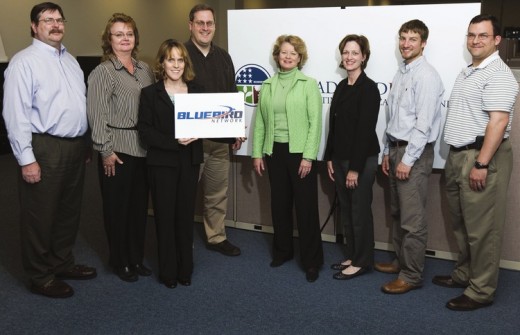Bluebird, Full Stream, Socket gear up for broadband build-out
Now that the hoopla over Google’s broadband beauty contest is over, it’s worth looking at how three homegrown companies are progressing with their plans to lay hundreds of miles of fiber-optic cable in mid-Missouri.
In August 2010, Bluebird Media received a $45 million federal grant to build a broadband network spanning 59 northern Missouri counties. Founded by brothers Chris and Tatum Martin of the Boonville telecom tower company GlenMartin, real estate magnate Otto Maly and Jefferson City entrepreneur Greg Johnston, Bluebird merged with Missouri Network Alliance last month to form Bluebird Network.
“We kind of approached each other,” said Eric Fogle, the Bluebird Media CEO who moved into the same position at the merged company. “The conversation started in earnest in October of last year.”
Based in Columbia, Bluebird Network is building what’s known in telecom as a “middle-mile” network. This infrastructure takes Internet traffic from long-haul networks that span the country and globe and passes it to local “last-mile” networks, such as the one that Socket Telecom is building with a separate federal grant.
Before the merger, Bluebird planned to lay about 800 miles of fiber and build microwave towers that would create the wireless equivalent of another 400 miles of fiber. The merger scuttled the microwave portion and added the roughly 3,000 miles of fiber that MNA owned or had access to.
“We have a more aggressive plan in terms of construction speed than we had prior to the merger,” Fogle said. “We have bigger engineering and operations teams. With the same grant dollars, we’re able to build a stronger, more robust network faster.”
Bluebird is in the final stages of a government review, required by the grant, that assesses how construction would affect the environment. Fogle expects the review to be complete in about 45 days, after which the company would break ground on the first seven segments.
“Construction would be coming in and out of Columbia by the first quarter of 2012,” Fogle said.
The Bluebird Network roughly stretches north from Cole County, through Boone County and up to Moberly, while stretching from Kansas City to St. Louis.
“So far, we’ve retained or created 32 jobs within Bluebird Network and our engineering contractors,” Fogle said. “This will continue to grow as we move into the construction phase of the project this summer.”
Socket expanding into TV and home security
Like Bluebird, Socket Telecom is in the final stages of an environmental review.
“We have been told to expect approval by end of April to mid-May,” said Carson Coffman, Socket’s co-owner and vice president of sales and marketing. “We’re hoping to have a contractor ready to go the day we get approvals.”
Socket plans to build a fiber-to-the-home network in central Callaway County and a sliver of eastern Boone County. Besides broadband Internet and telephone, the new network also will support TV. Socket hopes that this bundle, known in the industry as a “triple play,” will attract more revenue and customers than if it offered only one or two services.
Socket is currently building a “headend,” the industry name for the facility that takes satellite-delivered programming and then distributes it to customers. Socket expects to launch TV service by July 1, and it will be available only to customers on the new FTTH network rather than on its existing copper network, too.
The federal government is funding Socket’s and Bluebird’s projects as part of a nationwide effort to bring broadband to rural areas, where Internet access often is slow, expensive or unavailable. But that effort hits a wall in households that don’t own a computer and can’t afford one.
That’s why Socket is considering offering new rural customers a netbook or tablet, with the price bundled into their monthly service fee. By sparing budget-constrained households the upfront cost of buying a computer, that strategy could help Socket land customers who otherwise wouldn’t sign up for broadband.
“We believe renting/leasing a device for Internet consumption is a valid idea,” Coffman said. “With the new rush of tablets hitting the market, we’re hoping to see price points drop further.”
Socket also plans to use its new broadband network to expand into residential security.

Socket eventually might use the network to help utility companies deploy “smart” grids, which monitor and manage infrastructure such as electric meters.
“The smart grid has not gone very far,” Coffman said. “Callaway County Electric is already doing remote meter readings, and the city of Fulton is in the process of doing their own smart grid, so we don’t see much opportunity there at this time.”
Full Stream Wireless set to launch WiMAX
While Bluebird and Socket are focused on fiber, Columbia-based startup Full Stream Wireless is putting the finishing touches on a wireless network: Full Stream is using Worldwide Interoperability for Microwave Access (WiMAX), a technology that fellow users Clearwire and Sprint market as “Fourth Generation” or “4G.”
“Full Stream Wireless is in technical trials for WiMAX services in Columbia and will be announcing retail and commercial services availability in the near future,” said Richard Cravens, operations manager.
Full Stream won’t sell broadband wireless service directly to consumers and businesses. Instead, it will own and operate a network that provides wholesale service to resellers.


